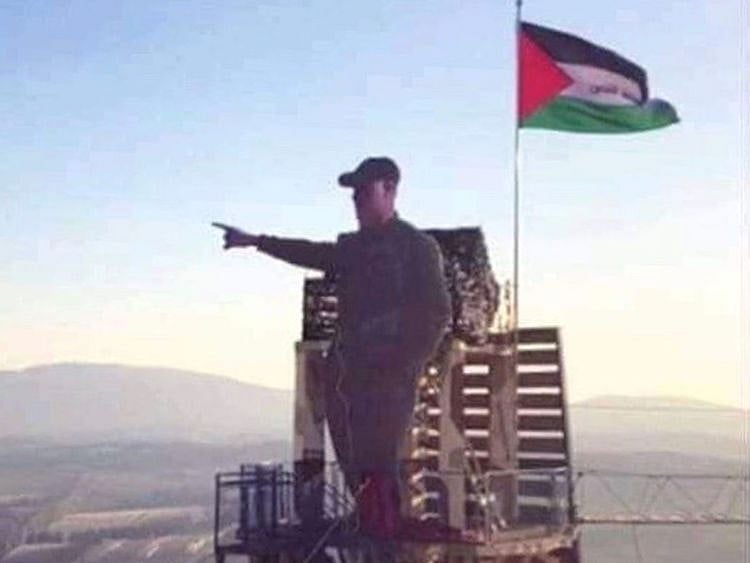Beirut: In Lebanese border village of Maroun Al Ras, a giant statue of General Qasem Soleimani, the commander of Iran’s Al Quds force who was assassinated by the US last month, was unveiled over the weekend.
Located less than a kilometre from the border with Occupied Palestine, the statue was unveiled by the Iran-funded Hezbollah militant group. Villagers, supporters and Hezbollah officials attended the presentation of the oversized cardboard statue of Soleimani, who was depicted with an extended arm and finger pointing towards Palestine in an insinuation to the common goals of Hezbollah and Iran to liberate Palestine from Israeli occupation.
The move by Hezbollah, which has a stranglehold over internal Lebanese politics, triggered heavy criticism and controversy amongst Lebanese.
Maria Bassem expressed utmost anger to the act of setting up a statue for Soleimani, and considered it “too confrontational and insulting”. She said: “We are Lebanese, not Iranians. Whoever is in love with or affiliated to Iran or any other foreign power, let him/her go and live there. We need to breathe and move on ... we need strong Lebanese nationalists ruling us. We need good patriotic leaders, who are not affiliated to any foreign powers. I am against setting up statues to commemorate any non-Lebanese figures,” she said.
A strong believer in freedom of expression and choice, Maria said she doesn’t stop anyone from having any affiliation with anybody, except at the expense of her identity and culture.
Meanwhile, Josephine M., a native of Yaroun village near Maroun Al Ras, was totally angered by the fact that such an “unwelcome” edifice had been erected in front of her family’s house.
“This is totally unacceptable. We have had dozens of Lebanese figures, who sacrificed their lives for the country. Why hasn’t there been any statue of any Lebanese martyr set up to commemorate their memory and martyrdom? Why do I have to see an Iranian general’s ? It feels very wrong! Actually it is irritating. This shouldn’t have happened … it exposes us as disloyal and unfaithful to our own country and its martyrs,” she told Gulf News.
The 74-year-old housewife said Soleimani’s photos posted on lampposts and billboards were “undesirable”.
Expressing a relatively different viewpoint, psychotherapist Isak Eid questioned the reasons behind fixing the statue in the south, and not in the southern suburb of Beirut.
Soleimani’s statue was put up in the south so as to face the Israeli enemy in an attempt to support the culture and concept of having an enemy, he believes. “It brings positive and negative effects on Lebanon … the positive effect is undoubtedly to grab more financial and material support from Iran. As for the negative, it implies that the south is affiliated to Iran first, and Lebanon second,” said Eid, adding that the initiative has triggered mixed reactions from the Lebanese.
The statue shouldn’t have been fixed up in the south, according to Eid, who believes that erecting it there strengthens the notion of a Hezbollah ghetto in the country.
Businessman Abed Mohammad could not comprehend what message was being relayed in setting up a statue for a non-Lebanese figure, regardless of whether it is Soleimani or anyone else.
“Such act is unprincipled and unacceptable. Though in the past, several statues were put up here, eventually they were taken down. A statue doesn’t add up to anything. Setting it up, is against all norms of patriotism ... actually I believe this move challenges the Lebanese more than it challenges Israel or the US, who are not bothered by the statue. This move incites internal conflict and is divise,” said Mohammad.
According to trader Rabih Ali, setting up the Soleimani’s statue represents a media message to the Israelis, nothing more.
“Unfortunately, the media in Lebanon brought this issue up now. But, in the past, they didn’t do the same when photos, slogans or statues of other non-Lebanese were put up. The media doesn’t play a constructive role; rather it focusses on irrelevant things such as this statue. It should instead focus on the country’s economic and financial woes and predicaments,” said Ali.
Sign up for the Daily Briefing
Get the latest news and updates straight to your inbox
Network Links
GN StoreDownload our app
© Al Nisr Publishing LLC 2026. All rights reserved.
